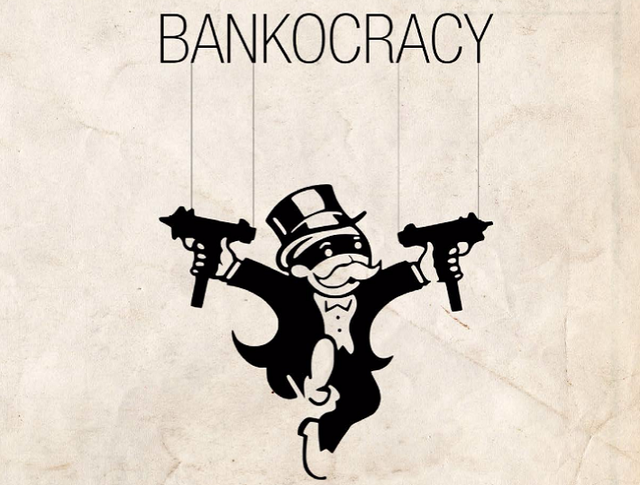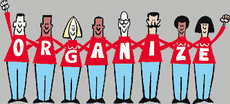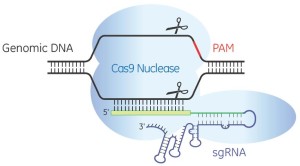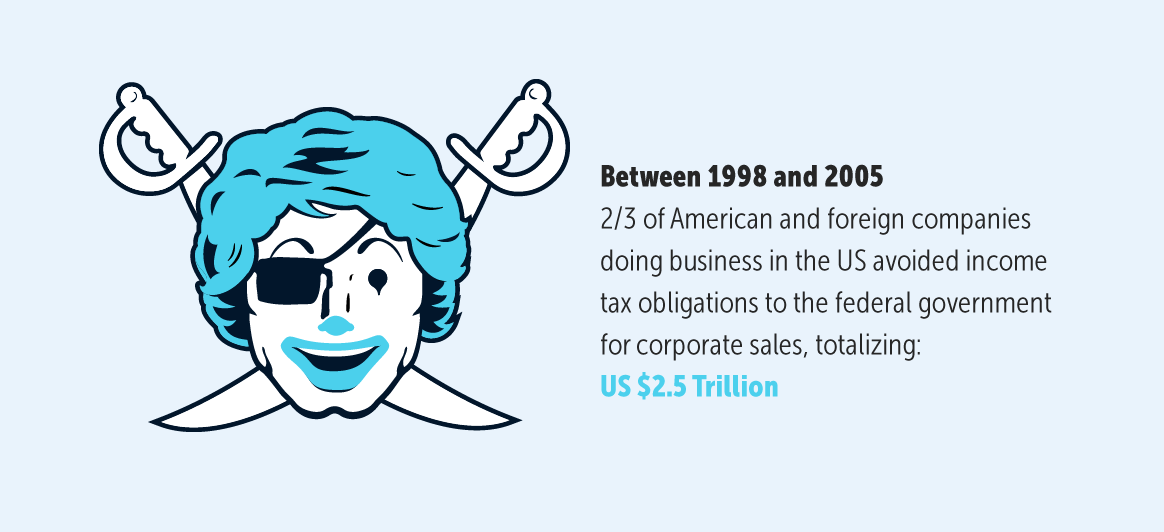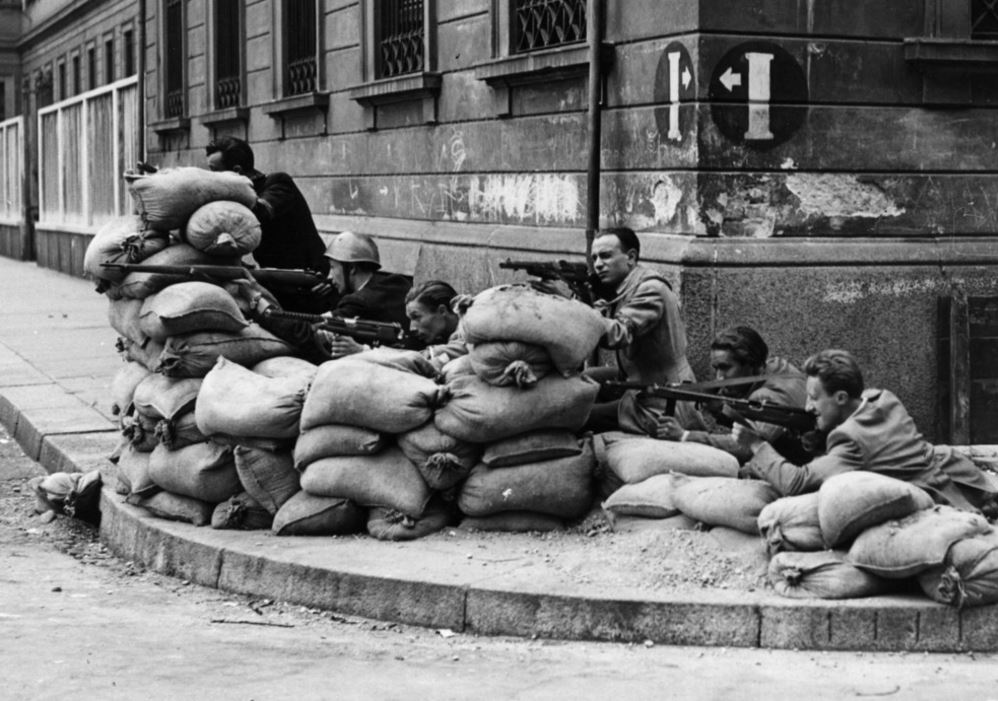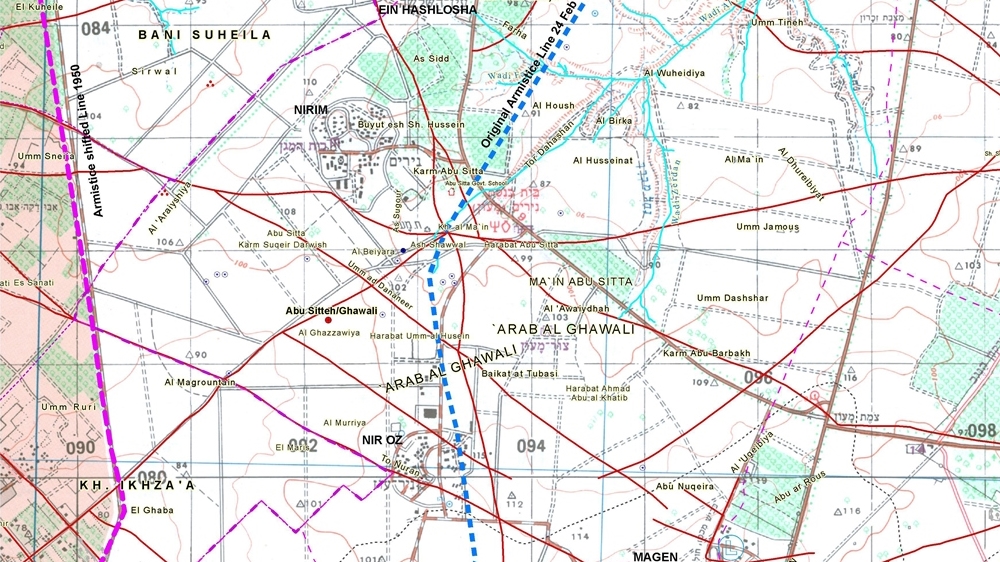Other Voices: The Connexions Newsletter
May 21, 2016
This Issue: Tax Evasion
The essence of the capitalist economic system is the drive to accumulate as much as possible, by any means possible. It is almost inevitable, therefore, that those – individuals or corporations -- whose existence revolves around accumulating capital will seek to avoid paying taxes.
The best way to avoid paying taxes, when you’re rich and powerful, is to shape and write the tax laws. And indeed tax laws are almost invariably written to favour those whose wealth derives from profits and investment, at the expense of those who work for a living. For example, capital gains – income from investments -- are either taxed at a much lower rate than wages, or not taxed at all.
Even so, this isn’t enough for the superrich. Employing a network of accountants, tax lawyers, corporate shells, tax havens, secret bank accounts, and other methods, the 1% have become extremely adept at evading even the low rates of taxation they are subjected to.
Tax evasion has recently hit the news with the leak of the Panama Papers, a huge collection of documents detailing the activities of just one law firm specializing in setting up offshore shell companies which serve to hide assets from the tax authorities. The Panama Papers reveal the existence of more than 200,000 such offshore entities linked to wealthy individuals from more than 200 countries. This nonetheless represents only the tip of the iceberg: there are other companies involved in this dirty business, and more than 20 jurisdictions which cater to it, including the American states of Delaware and Wyoming, as well as the Bahamas, Belize, Singapore, and the United Kingdom. It is estimated that about $330 billion is lost to tax evasion and tax avoidance every single year, and that perhaps 7% of the world’s total financial wealth is hidden in secretive tax havens.
In this issue, we focus on tax evasion, with a selection of articles, books, and films.
We also look at the myth of precision that is used to justify reckless experiments in gene manipulation, and we feature Vivek Chibber’s article “Why the Working Class?” which analyzes the unique power of the working class in challenging the power of capitalism.
As always, we invite you to share this newsletter with your friends. You can forward this email, or send them the link to the Other Voices home page on the Connexions website at www.connexions.org/Media/CxNewsletter.htm.
If you'd like to subscribe and receive this newsletter by email every two weeks, please use this form.
Your feedback is appreciated - and so are donations to keep us doing what we're doing!

Topics of the Week
Tax Evasion
It is estimated that about US$330 billion is lost each year to tax avoidance and evasion. The total value of this untaxed wealth – in effect, the accumulated proceeds of organized crime -- is now believed to total at least $7.6 trillion, or about 8 percent of the world’s total financial wealth. Find resources about tax evasion here.
This Week on Connexions.org
The Panama Papers
The Panama Papers, based on a trove of more than 11 million files leaked by a whistleblower, have resulted in a global investigation into the sprawling, secretive industry of offshore tax havens that the world’s rich and powerful use to hide assets and skirt rules by setting up front companies in far-flung jurisdictions. The lead organization in this international investigation is the International Consortium of Investigative Journalists (ICIJ). The resulting reports have exposed a cast of characters who use offshore companies to facilitate bribery, arms deals, financial fraud, drug trafficking, as well as plain old tax evasion. See the ICIJ’s reports and analyses here.
Keywords: Tax Evasion - Tax Havens
Beyond Panama: Unlocking the world’s secrecy jurisdictions
The 21 jurisdictions covered by the Panama Papers data vary from the rolling hills of Wyoming to tropical getaways like the British Virgin Islands. But all have at least one thing in common - secrecy is the rule. Read more
Keywords: Tax Evasion - Tax Havens
What is to be done with the banks? Radical proposals for radical changes
Nine years after the outbreak of the financial crisis that continues to produce damaging social effects through the austerity policies imposed on victim populations, it's time to take another look at the commitments that were made at that time by bankers, financiers, politicians and regulatory bodies. Those four players have failed fundamentally in the promises they made in the wake of the crisis – to moralise the banking system, separate commercial banks from investment banks, end exorbitant salaries and bonuses, and finally finance the real economy. Read more
Keywords: Banking - Banking Industry
Why the Working Class?
Workers are at the heart of the capitalist system. And that's why, says Vivek Chibber, they are at the centre of socialist politics. Social transformation requires a source of leverage, a source of power that can overcome the resistance of the capitalist class and its political functionaries. The working class has this power, for a simple reason -- capitalists can only make their profits if workers show up to work every day, and if they refuse to play along, the profits dry up overnight. This ability to crash the entire system, just by refusing to work, gives workers a kind of leverage that no other group in society has, except capitalists themselves. This is why, if progressive social change requires overcoming capitalist opposition -- and we have learned over three centuries that it does -- then it is of central importance that workers organize so that they can use that power. Read more
Keywords: Organizing for Social Change - Working Class
God’s Red Pencil? CRISPR and The Three Myths of Precise Genome Editing
For the last seventy years all chemical and biological technologies, from genetic engineering to pesticides, have been built on a myth of precision and specificity. They have all been adopted under the pretense that they would function without side effects or unexpected complications. Yet the extraordinary disasters and repercussions of DDT, leaded paint, agent orange, atrazine, C8, asbestos, chlordane, PCBs, and so on, when all is said and done, have been stories of the steady unraveling of a founding myth of precision and specificity.
Nevertheless, with the help of industry propagandists, their friends in the media, even the United Nations, we are once again being preached the gospel of precision. But no matter how you look at it, precision is a fable and should be treated as such. Read more
Keywords: Genetic Engineering - Science & society
Website of the Week
International Consortium of Investigative Journalists
The International Consortium of Investigative Journalists is an active global network of 160 reporters in more than 60 countries who collaborate on in-depth investigative stories. Founded in 1997, ICIJ was launched as a project of the Center for Public Integrity to engage in watchdog journalism, focusing on issues that do not stop at national frontiers: cross-border crime, corruption, and the accountability of power. Visit
Keywords: Investigative Journalism - Tax Havens
Book of the Week
The Trouble with Billionaires
By Linda McQuaig and Neil Brooks
The glittering lives of billionaires may seem to be a harmless source of entertainment, but authors Linda McQuaig and Neil Brooks argue that such financial power not only threatens everyone's economic and social well-being but also upsets the very functioning of democracy. Our society tends to regard great wealth as evidence of exceptional talent or accomplishment. Yet spectacular fortunes are often attributable to luck, ruthlessness, cheating, or advantageous positioning that allow some to build on the work and insights of others who have paved the way. Read more
Keywords: The Superrich - Inequality
Films of the Week
The Price we Pay
By Harold Crooks
This documentary, inspired by Brigitte Alepin's book La Crise fiscale qui vient, shines a light on the dark history and dire present-day reality of big-business tax avoidance, which has seen multinationals depriving governments of trillions of dollars in tax revenues by harbouring profits in offshore havens. Watch
Keywords: Corporate Tax Evasion - Tax Avoidance
The Great Canadian Tax Dodge
By Robin Benger
It is estimated that between 100 and 170 billion dollars leaves Canada every year, untaxed. Much of it is siphoned off to Canadian-made offshore tax havens. "The Great Canadian Tax Dodge" documents the birth of the Canadian Tax Fairness movement and examines the issue of tax avoidance, exposing the sophisticated corporate strategies and tax loopholes commonly used to legally avoid tax. Watch
Keywords: Tax Havens - Tax Avoidance
Organizing
A Question of Place
By Grace Lee Boggs
Global capitalism relentlessly displaces people and abandons places because it views local communities, cities, and even nations as inconveniences in the path of progress. Place-consciousness, on the other hand, encourages us to come together around common, local experiences and organize around our hopes for the future of our communities and cities. While global capitalism doesn't give a damn about the people or the natural environment of any particular place because it can always move on to other people and other places, place-based civic activism is concerned about the health and safety of people and places. Read more
Keywords: Community Empowerment> - Community Organizing>
People's History
The Lost Partisans
Italy's April 25 holiday marks the anniversary of the country's liberation from fascism. On that day in 1945, anti-fascist partisan units freed the northern industrial centres of Milan and Turin from the grip of Hitler and Mussolini's remaining loyalists, after Allied forces had swept through the country. Just three days later, in a humiliating epitaph to the twenty-year regime, partisans captured and executed il Duce and his entourage, hanging them upside down in Milan's Piazzale Loreto. Today the resistance is remembered more as representing 'national unity' than working-class resistance to fascism. Read more
Keywords: Anti-Fascism - Fascism in Italy
From the Archives
The Man Reconstructing Palestine's Lost Villages
Abu Sitta has diligently reconstructed and mapped the future for all Palestinians laying the groundwork for their homecoming. "Our plan is to reconstruct the destroyed Palestinian villages. The plans are derived from a massive database. We are creating a file for every village, its house plans before 1948, its features and characteristics, its economies and its status of education. Read more
Connexions Calendar
May 21, 2016 – International
March Against Monsanto
On May 21, 2016, activists around the world will, once again, unite to March Against Monsanto.
May 22, 2016 – International
The International Day for Biological Diversity (IDB)
The IDB has been proclaimed to increase understanding and awareness of biodiversity issues.
May 24, 2016 – Ottawa
Book launch of 'What's Yours is Mine: Against the Sharing Economy' with Author Tom Slee
In What's Yours Is Mine, Tom Slee argues the so-called sharing economy damages development, extends harsh free-market practices into previously protected areas of our lives, and presents the opportunity for a few people to make fortunes by damaging communities and pushing vulnerable individuals to take on unsustainable risk.
May 25 - 26, 2016 – Cornwall, Ontario
Great Nations, Great River: Collective Efforts to Engage Communities through Science and Action
The 2016 Great Nations, Great River Symposium provides a platform for researchers, educators, policy-makers, community leaders and citizens to share knowledge about the status of the St. Lawrence River/Great Lakes and other freshwater ecosystems and their responses to changing conditions. A focus this year will be sharing knowledge about how the research and environmental community can empower communities to protect water, restore wetlands, improve beaches, enhance understanding and consider adaptive management practices.
May 27, 2016 – CBC Radio One / SiriusXM Channel 169 (9:00 pm EST)
Imprisoned by Profit: Media and Democracy with Palagummi Sainath
P. Sainath believes the media around the world is, for the most part, imprisoned by profit and not politically free.
May 27, 2016 – Saint John, New Brunswick
Bay of Fundy: Energy East - Our Risk, Their Reward
Join us for this free town hall event to hear from Ben Gotschall, Agriculture and Food Director at Bold Nebraska, Mark D'Arcy of the Council of Canadians and Alma Brooks of the Peace and Friendship Alliance on why Energy East is more risk than reward for New Brunswick..
The Connexions Calendar is an online calendar that exists to advertise events that support social justice, democracy, human rights, ecology, and other causes. We invite you to use it to promote your events. Adding events to the Connexions Calendar is FREE. We'll give you a username and password which you use to log on. Use the contact form to arrange for a username and password. Read more →
Seeds of Fire
May 23 - 24, 1934
The "Battle of Toledo"
The start of the “Battle of Toledo,” a five-day running battle pitching striking workers in Toledo against police, national guard troops, and hired thugs. Two strikers are killed, and more than 200 injuries, but the strike ends in victory: union recognition, a wage increase, and the rehiring of all fired workers.
May 26, 1932
Founding of the Co-operative Commonwealth Federation
Members of the ‘Ginger Group’ of Members of Parliament and members of the League for Social Reconstruction meet in Calgary and decide to form a new Canada-wide left-wing political party. The temporary name adopted for the new party is the “Commonwealth Party”, later changed to “Co-operative Commonwealth Federation (Farmer-Labour-Socialist).” The party wins seven seats in the 1935 federal election. In 1944, it wins the Saskatchewan provincial election under leader T.C. Douglas and becomes the first social-democratic party to take office in North America.
May 27, 1917
French Army Mutiny
A widespread mutiny breaks out among French army troops serving on the Western Front in the Great War (World War I). On May 27, some 30,000 soldiers leave the front line. The soldiers believe, rightly, that their lives are being squandered in futile offensives ordered by incompetent commanders safely in the rear who are indifferent to the casualties suffered by soldiers at the front. The mutiny spreads in the following days. It is estimated that half of the French infantry takes part in the mutinies. However, the mutinous soldiers fail to organize themselves to resist the inevitable retaliation by the army command. Consequently, the French high command is able to reassert control after June 8, using still-obedient troops to quell the mutiny. Eventually 23,385 men are convicted of mutiny. 554 men are sentenced to death.
May 29, 1969
The Córdobazo
Workers go out on a general strike in the city of Córdoba in Argentina. The strike grows out of a resistance to the repressive policies of the Argentine military dictatorship headed by General Juan Carlos Onganía. The uprising is put down by the military, but contributes to the radicalization of workers and students in other parts of the country.
June 1378
Revolt of the Ciompi
Low-status workers in Florence’s textile industry, known as ciompi, rise in revolt demanding the right to have a say in the governing structures of the commune and the textile industry. They take up arms and attack government buildings. On July 21, they forcibly take over the government and bring about a number of democratic reforms, including the creation of additional guilds which will give them access to political representation.
June 3, 1935
On to Ottawa Trek
Hundreds of men board railway boxcars in Vancouver and start heading east on the On to Ottawa Trek. The Trekkers are unemployed workers, part of a group of thousands who have walked out of federal relief camps protesting dismal conditions and dangerous work. They plan to present their grievances directly to the federal government in Ottawa.

Your support is needed to keep Connexions going
All of the work of the Connexions project is done by volunteers, but our expenses include rent, phone and computer costs and technical support, as well as expenses related to our ongoing project of converting printed archival materials into digital formats. You can make a one time or regular monthly contribution through the donate page on the Connexions website.
Bequests
Many of us have made working for social justice a lifetime commitment. If you are thinking about leaving a legacy for social justice that will live on, you might want to consider leaving a bequest to Connexions in your will. If you'd like to discuss this option, please contact us or see the Bequest page.




